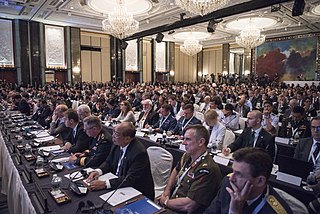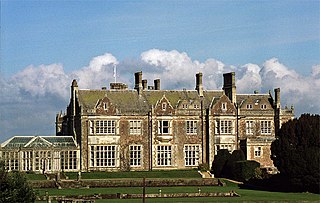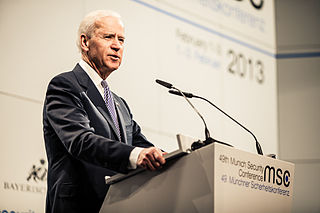
Kazakhstan's approach to foreign relations is multifaceted and strategic, reflecting the country's unique geopolitical position, historical context, and economic ambitions. At the heart of its international diplomacy is a multivector foreign policy, which aims to maintain balanced and diverse relations with all major global powers and regional neighbours. Kazakhstan is a member of the United Nations, Collective Security Treaty Organization, Organization for Security and Co-operation in Europe, North Atlantic Cooperation Council, Commonwealth of Independent States, the Shanghai Cooperation Organisation, and NATO's Partnership for Peace program. Kazakhstan established a customs union with Russia and Belarus which eventually became the Eurasian Economic Union. President Nazarbayev has prioritized economic diplomacy into Kazakhstan's foreign policy.

Security is protection from, or resilience against, potential harm. Beneficiaries of security may be persons and social groups, objects and institutions, ecosystems, or any other entity or phenomenon vulnerable to unwanted change.

The Foreign, Commonwealth and Development Office (FCDO) is the ministry of foreign affairs and a ministerial department of the Government of the United Kingdom.

The International Institute for Strategic Studies (IISS) is an international research institute or think tank focusing on defence and security issues. Since 1997, its headquarters have been at Arundel House in London. It has offices on four continents, producing data and research on questions of defence, security and global affairs, publishing publications and online analysis, and convening major security summits. The Guardian newspaper has described the IISS as ‘one of the world’s leading security think tanks.’
The National Security Strategy (NSS) is a document prepared periodically by the executive branch of the United States that lists the national security concerns and how the administration plans to deal with them. The legal foundation for the document is spelled out in the Goldwater–Nichols Act. The document is purposely general in content, and its implementation relies on elaborating guidance provided in supporting documents such as the National Military Strategy.
In international relations, public diplomacy broadly speaking, is any of the various government-sponsored efforts aimed at communicating directly with foreign publics to establish a dialogue designed to inform and influence with the aim of building support for the state's strategic objectives. These also include propaganda. As the international order has changed over the twentieth century, so has the practice of public diplomacy. Its practitioners use a variety of instruments and methods ranging from personal contact and media interviews to the internet and educational exchanges.

The Munich Security Conference is an annual conference on international security policy that has been held in Munich, Bavaria, Germany since 1963. Formerly named the Munich Conference on Security Policy, the motto is: Peace through Dialogue.

The IISS Asia Security Summit: The Shangri-La Dialogue (SLD) is a "Track One" inter-governmental security conference held annually in Singapore by the Bahraini-funded think tank, the International Institute for Strategic Studies (IISS). The dialogue is commonly attended by defence ministers, permanent heads of ministries and military chiefs of mostly Asia-Pacific states. The forum's name is derived from the Shangri-La Hotel in Singapore, where it has been held since 2002.
Oxford Research Group (ORG) was a London-based charity and think tank in Cambridge Heath, London, UK working on peace, security and justice issues. Its research and dialogue activities were mainly focused on the Middle East, North and West Africa, as well as influencing UK and international security policy.
The S. Rajaratnam School of International Studies (RSIS) is an autonomous graduate school and policy-oriented think tank of Nanyang Technological University (NTU) in Singapore. Founded in 1996 as the Institute of Defence and Strategic Studies (IDSS), RSIS offers graduate education in international affairs and strategic studies, taught by an array of international faculty. The school is named in honour of S. Rajaratnam, Singapore's former Deputy Prime Minister who had also been its longest-serving Foreign Minister. It is regarded as one of the best graduate schools for international studies in Asia.

The George C. Marshall European Center for Security Studies is a bi-national United States Department of Defense and Federal Ministry of Defence (Germany) security and defense studies institute. When the Marshall Center was founded in 1993, its mission was to create a more stable security environment by advancing democratic institutions and relationships, especially in the field of defense; promoting active, peaceful, security cooperation; and enhancing enduring partnerships among the nations of North America, Europe, and Eurasia. As of Oct. 1, 2014, the Marshall Center's regional mission changed to a transnational one based on an Office of the Secretary of Defense directive to change from a European to a global participants' base.

Relations between the European Union and the Republic of India are currently defined by the 1994 EU–India Cooperation Agreement. The EU is a significant trade partner for India and the two sides have been attempting to negotiate a free trade deal since 2007. Indo-EU bilateral trade stood at US$104.3 billion in the financial year 2018–19.
LSE IDEAS is a foreign policy think tank at the London School of Economics and Political Science. IDEAS was founded as a think tank for Diplomacy and Strategy in February 2008, succeeding the Cold War Studies Centre founded in 2004. It is led by Professor Christopher Alden and Professor Michael Cox. LSE IDEAS has been ranked as the top European university-affiliated think tank and the number two university-affiliated think tank in the world.

Cyber-diplomacy is the evolution of public diplomacy to include and use the new platforms of communication in the 21st century. As explained by Jan Melissen in The New Public Diplomacy: Soft Power in International Relations, cyber-diplomacy “links the impact of innovations in communication and information technology to diplomacy.” Cyber-diplomacy is also known as or is part of public diplomacy 2.0, Digital diplomacy, EDiplomacy, and virtual diplomacy. Cyber-diplomacy has as its underpinnings that, “it recognizes that new communication technologies offer new opportunities to interact with a wider public by adopting a network approach and making the most of an increasingly multicentric global, interdependent system.”

The Institute for National Security Studies (INSS) is an independent think tank affiliated with Tel Aviv University in Israel that conducts research and analysis of national security matters such as military and strategic affairs, terrorism and low intensity conflict, military balance in the Middle East, and cyber warfare.
Rachel Briggs OBE was Founding Executive Director of Hostage US, the first Director of Hostage UK and was awarded an OBE in the 2014 Honours List for services to hostages and the families of victims kidnapped overseas. She is the Chair of the Board of Directors of the Global Center on Cooperative Security, an expert on foreign and security policy and an Associate Fellow of Chatham House.

Wiston House is a 16th-century Grade I listed building set in the South Downs National Park on the south coast of England, surrounded by over 6,000 acres (2,400 ha) of parkland in Wiston, West Sussex. It is the home of Wilton Park, an executive agency of the Foreign and Commonwealth Office.

The 49th Munich Security Conference was held from 1 to 3 February 2013. More than 400 senior politicians and business executives, as well as high-ranking military officials and security experts from 90 countries attended the event. This included over 90 delegations, a dozen heads of state, 70 foreign and defence ministers, ten US senators, five EU Commissioners, five German federal ministers and 60 members of the German Bundestag and an equal number of CEOs. Some 700 journalists were accredited for the event.
The Bled Strategic Forum is a global ideas platform founded by the government of the Republic of Slovenia.

Richard David Arthur Burge is an independent adviser on international trade, and organisational management and leadership. He is the founder and co-director of ESG Validation Ltd.













